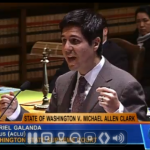Today the Washington State Supreme Court ruled against a Colville tribal member and pro-tribal friends of the court in State v. Clark. But, in the case --which Gabe Galanda co-argued, on behalf of the ACLU--there are stark silver linings that affirm tribal sovereignty, especially in Washington Indian Country and Treaty territory.
The case concerned whether a county search warrant, obtained and executed by city police without any attempt to involve the tribal police or court, lacked authority of law, since it authorized the search of a tribal member defendant’s home situated on reservation trust land. The Supreme Court affirmed the defendant's "conviction for theft because the trial court properly denied his motion to suppress evidence gathered on tribal trust land without a tribal warrant."
But the silver linings lie in the Court's reasoning:
Clark asks us to recognize the Colville Tribes' interest by adopting the test used by the Supreme Court of Idaho in Matthews, which measures the infringement of tribal sovereignty by looking to whether the State ignored governing tribal procedures while serving criminal process. Ifthe State did so, then under Matthews the State undermined tribal self-government. The material facts of Matthews are quite similar to those of Hicks: state police searched tribal property for an off-reservation crime. Hicks' holding has superseded Matthews for this particular factual scenario. However, we agree that Matthews serves as the starting point for searches of reservation lands where Hicks is distinguishable, such as where the crime occurs on reservation land over which the State has jurisdiction. Consequently, we hold that the State does not infringe tribal sovereignty by searching reservation lands unless it disregards tribal procedures governing the execution of state criminal process.
What this means is that state law enforcement must follow tribal procedures governing the execution of state criminal process, before searching reservation lands. In Clark, the Court found the Colville tribe's procedure wanting because it "does not govern the way the State executes its own process. Indeed, the tribal warrant provision does not guarantee that the State could execute its warrant as the tribal court could refuse to issue a tribal warrant."
Still, if tribes promulgate clear codified procedures for the execution of state process on reservation lands (18 U.S.C. 1151), states and state police must honor those procedures. And crucially, that is notwithstanding Nevada v. Hicks. This is the starkest silver lining from Clark.
The other silver lining lies in footnote 9 to the last page of the opinion: "Clark does not argue that any treaty provision creates governing procedures for executing a state search warrant . . . We do not foreclose the possibility that the State would infringe tribal sovereignty by disregarding governing procedures created by such provisions with our opinion today. See State ex rel. Merrill v. Turtle, 413 F.2d 683, 686 (9th Cir. 1969)." In other words, Treaty tribes, such as all Stevens Treaty signatories, have an even stronger basis to force state police to honor codified tribal procedures that govern state process on reservation lands, especially through inherent territorial exclusion rights. That, too, is notwithstanding Hicks, which did not involve Treaty rights.
So although the decision was a tribal defeat, there are silver linings to the Washington Supreme Court's playbook in Clark.

Gabriel "Gabe" Galanda is a partner at Galanda Broadman PLLC, of Seattle, an American Indian owned law firm. He is an enrolled member of the Round Valley Indian Tribes of Covelo, California. Gabe assists tribal governments and businesses in all matters of tribal sovereignty and self-governance, especially in legal opposition to federal, state and local government encroachment. Gabe can be reached at 206.691.3631 or gabe@galandabroadman.com. His argument in Clark can be watched on TVW (at 35:49).
Ryan will speak from his forthcoming law review article, tentatively titled,"Reenfranchising the Native Vote After Shelby County v. Holder." In that paper, he argues that Section 5 of the federal Voting Rights Act "is both an appropriate and necessary measure to prevent ongoing voting discrimination targeting Native American citizens, and concludes that "Congress not only has the power to compel preapproval of state voting legislation that is applicable to Indian Country, but it has an obligation to do so."


 Article III of the Treaty with the Nez Perces of 1855 reserved for Nez Perce Indians the “right of taking fish at all usual and accustomed places” and “the privilege of hunting . . . upon open and unclaimed land.” As the court explained: "Although the Nez Perce ceded the lands now encompassing the Nez Perce Clearwater National Forests to the United States, 'they did not relinquish rights to hunt, fish, and gather, or to practice traditional religious and cultural ceremonies on these ancestral homelands.'”
Article III of the Treaty with the Nez Perces of 1855 reserved for Nez Perce Indians the “right of taking fish at all usual and accustomed places” and “the privilege of hunting . . . upon open and unclaimed land.” As the court explained: "Although the Nez Perce ceded the lands now encompassing the Nez Perce Clearwater National Forests to the United States, 'they did not relinquish rights to hunt, fish, and gather, or to practice traditional religious and cultural ceremonies on these ancestral homelands.'”





